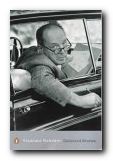a critical examination of Nabokov’s collected stories
 ‘Vasiliy Shishkov’ (August 1939) need not detain us long. It is a story which would hardly make any sense at all without its biographical note. The émigré poet George Adamovich had been a consistent critic of Nabokov’s work, and Nabokov had tricked him by writing a poem under the eponymous pseudonym which Adamovich had praised. To capitalise on this by revealing the joke, Nabokov published the story in question in the newspaper to which Adamov contributed a weekly column. This is a very typical piece of Nabokov’s literary mischief.
‘Vasiliy Shishkov’ (August 1939) need not detain us long. It is a story which would hardly make any sense at all without its biographical note. The émigré poet George Adamovich had been a consistent critic of Nabokov’s work, and Nabokov had tricked him by writing a poem under the eponymous pseudonym which Adamovich had praised. To capitalise on this by revealing the joke, Nabokov published the story in question in the newspaper to which Adamov contributed a weekly column. This is a very typical piece of Nabokov’s literary mischief.
The first person narrator, who turns out to be called Gospodin Nabokov, is approached by an eager young man: ‘My name is Vasiliy Shishkov. I am a poet’ (TD,p.207). He wants Nabokov to give him a sincere judgement of his work. When he produces the poems they turn out to be worthless trash, and Nabokov tells him so, whereupon he reveals that he has deliberately made them so to test the rigour of Nabokov’s honesty.
He then produces his real work, which is very good. In addition he confesses to suffering an acute form of Weltschmerz and even plans to publish a magazine called ‘A Survey of Pain and Vulgarity’. When this project falls through he decides to simply disappear, leaving his work behind. The joke concludes with the narrator’s observation ‘in a wildly literal sense … he meant disappearing in his art, dissolving in his verse’ (p.215).
It is only in this sense, as a case study of what Nabokov (Vladimir Nabokov, that is) calls ‘one poet dissolving in another’ (p.206) that the story has any independent meaning, and even then the fiction quickly bites its own tail because there is not an extant body of work by the imaginary poet, only that written by Nabokov under his name. But what the story does show is the manner in which Nabokov was keen to exploit the interfaces between art and life as the sources for his fiction.
So the story is autobiographical in two senses. Its origins lie in the historical rivalry between Adamovich and Nabokov; and Nabokov’s own life as an exile in 1939 is obviously being paralleled in the concerns of a poet who feels under threat from the world and who hopes that his work will survive him.
Although ‘Vasiliy Shishkov’ might be a slight piece of work, Nabokov went on later the same year to produce one of his most serious and accomplished longer stories – and one which deals with precisely the desperate extremes of émigré life. It even reflects the geographic relocations of emigration at that time. For as the Nazis moved westwards there was only one direction to go for those émigrés trapped in Paris, and that was southwards towards the Riviera.
© Roy Johnson 2005
![]() Vladimir Nabokov: The Collected Stories – Amazon UK
Vladimir Nabokov: The Collected Stories – Amazon UK
![]() Vladimir Nabokov: The Collected Stories – Amazon US
Vladimir Nabokov: The Collected Stories – Amazon US
Vladimir Nabokov web links
Vladimir Nabokov greatest works
Vladimir Nabokov criticism
Vladimir Nabokov life and works